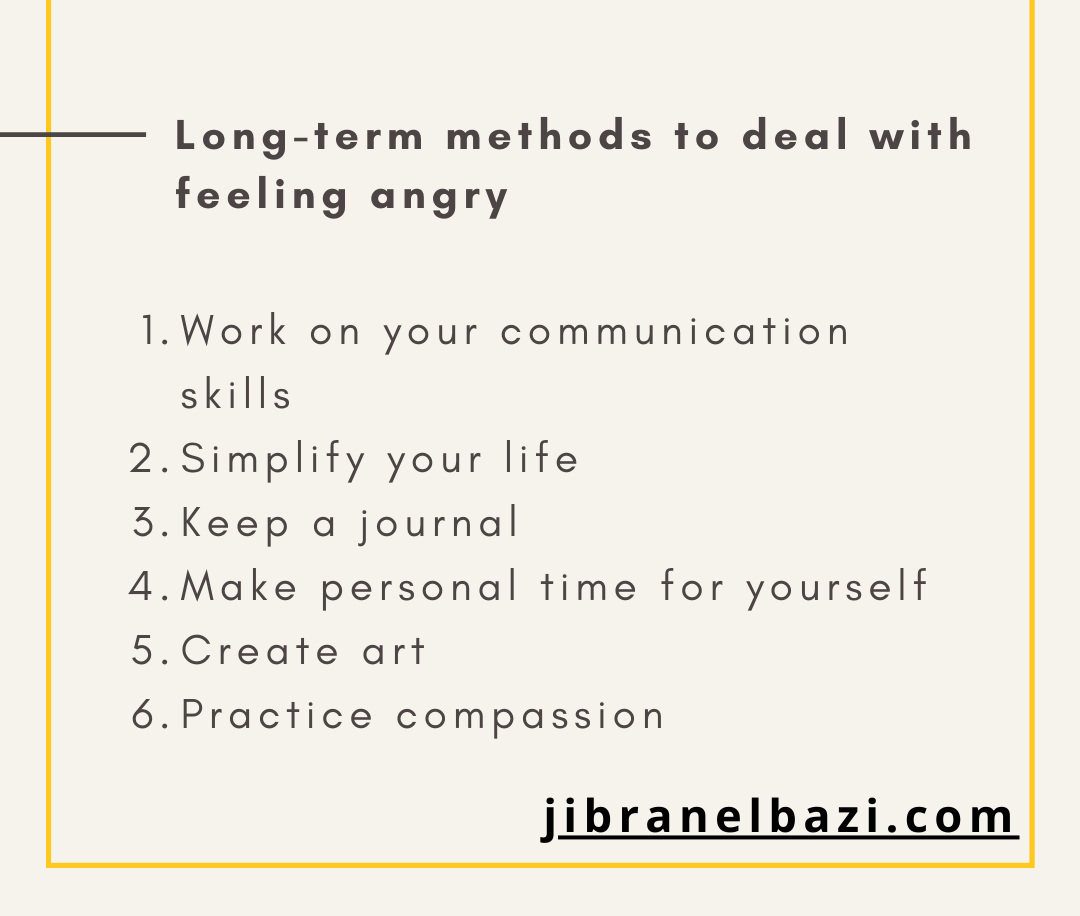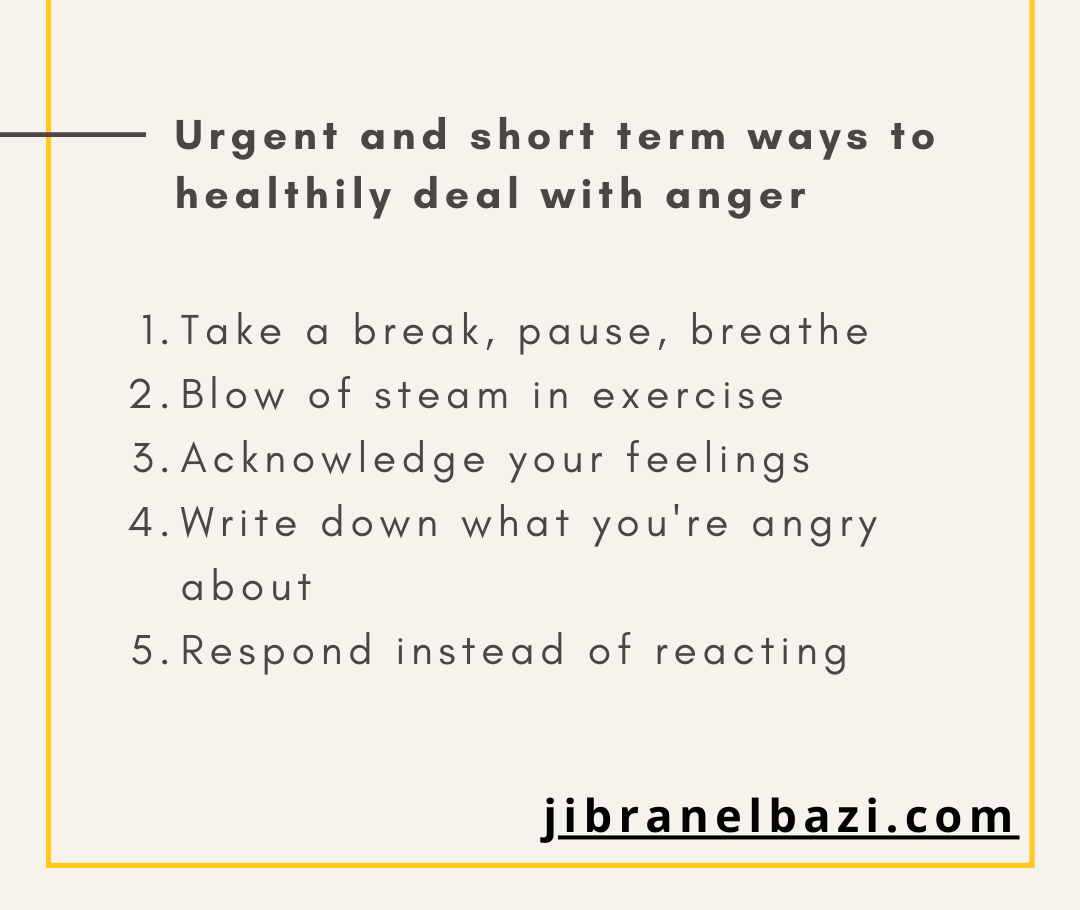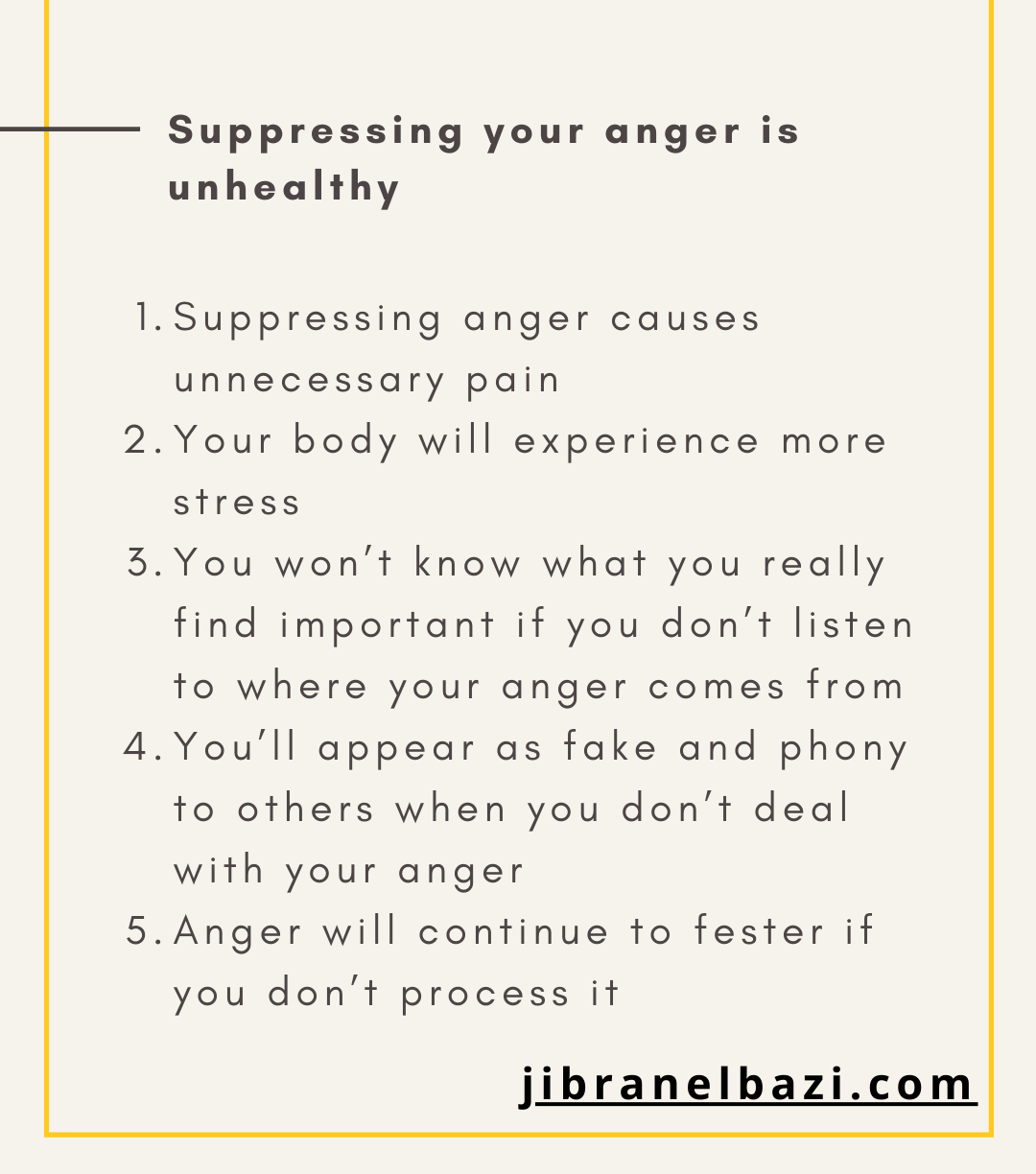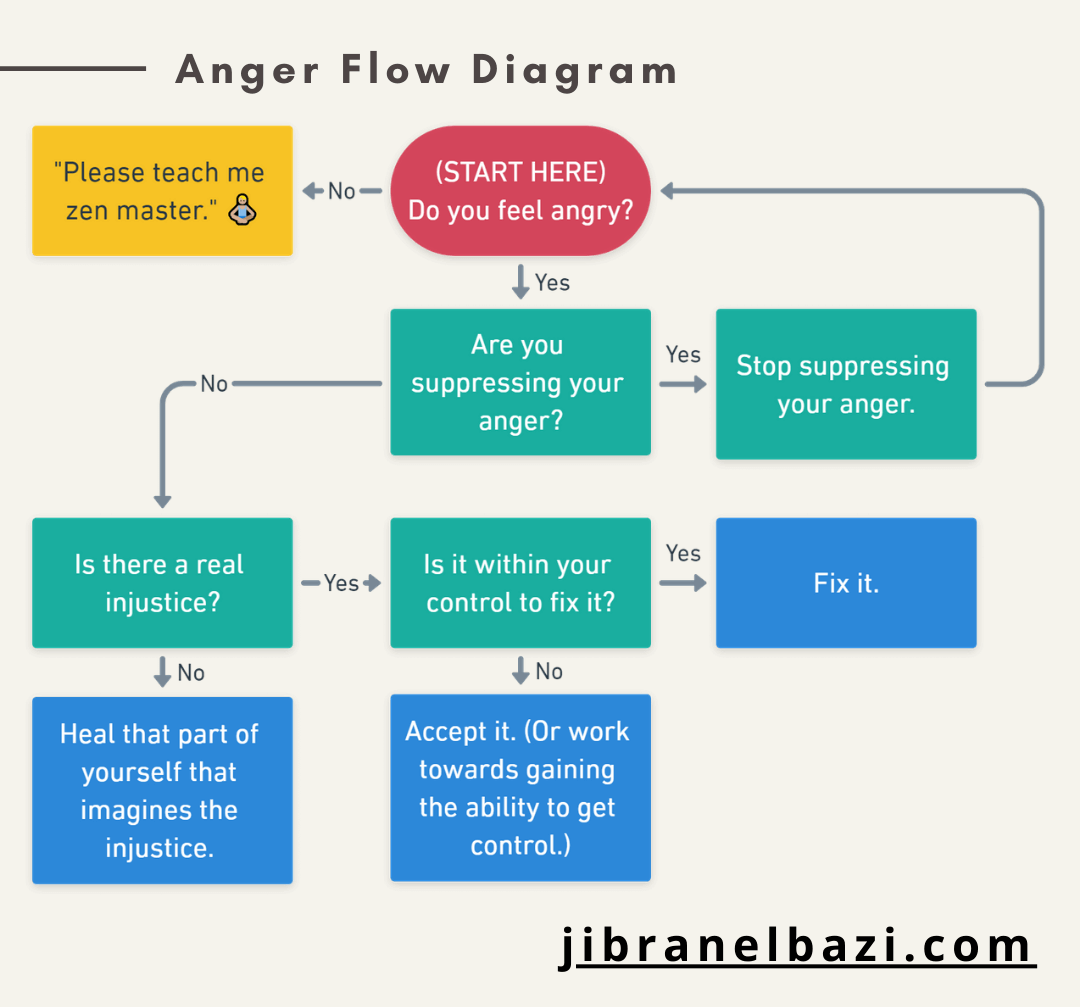What we’ll cover in this article:
Why it's helpful and OK to be angry
How to deal with your anger in a positive way
What not to do when you feel angry
How to use anger for good
Bonus “Anger Flow Diagram”
So, I bought a punching bag at my son's wish. Why? Well, over the last few months, our couch pillows weren't cutting it as punching objects anymore... Like his father, he regularly needs to blow off steam to help dissolve feelings of anger. He's 6 years old, and it's still difficult to help him understand that he shouldn't repress his anger or be (verbally) aggressive towards others and himself. So a punching bag is an excellent way to get out of his head and into his body — and then to open up and be able to talk about how he feels.
Often we tell ourselves that we aren't allowed to be angry, but I'm here to tell you that it's essential to feel your anger in order to live a balanced life. The best way to manage your anger healthily and productively is to understand why you're angry and what you should and shouldn't do with that feeling.
Why it's helpful and OK to be angry
Anger is an emotion that signals something important to you
First, notice that anger is an emotion, not a behavior. It's not the same as aggression, which is a behavior, although aggression can result from feelings of anger. Like other emotions such as joy, disgust, compassion, and sadness, anger signals something important to you. Anger specifically signals for injustice or threats, either perceived or real. So it serves to keep you safe in situations where control is taken away from you. Like Peter Walker says, "For just as without work there would be no play; without hunger, no satiation; without fear, no courage; without tears, no joy; and without anger, no real love." anger is a signal for possibly losing what you love.
Of course, it's crucial to ask yourself some questions when you feel angry: are you really losing something? Did you ever have control in the first place over what you think you'll lose? Is what is happening unjustified?
Or the most common issue with frequent anger:
"isn't there something deeper inside of me that I'm so sad about that I need to resolve?"
It may be that you feel anger because it comes from a feeling of sadness (that you're repressing) that you can better resolve through other means. For example, maybe unjustified situations from your past still linger in your mind but are better solved through other means than feeling angry all the time. Solutions like therapy, creative writing, talking to loved ones, building good habits, or pursuing what you really want.
Anger is a motivating force; it produces action
You might not make the connection between anger and the possibility of loss right away. But anger as a response to potential loss is a very well understood part of our biology. The risk of loss ignites a fight or flight response. The fight response, anger, is our proactive response to danger. It helps you to take action. It allows you to survive.
Anger is an approaching response instead of a withdrawal response (flight). Both fight and flight are beneficial behaviors, but they are very much instinctual. And the nature of our instinctual behavior, especially if we didn't have good role models during our early childhood, is that they can misfire. So, for example, maybe you were rarely allowed to be angry or sad. Or on the other hand, you were allowed to be angry or sad, but you weren't reprimanded on the subsequent actions you took during your emotional bouts.
If you manage your anger in a healthy way, you may find it can give you the energy you need to take action towards an outcome that helps you and others.
How to deal with your anger in a positive way
For your continued well-being and mental health, it's essential to deal with your anger healthily. Some methods work best for longer-term and suppressed anger, while other methods, like taking a break, work best for short-term bouts of anger.
Long-term methods to deal with feeling angry
#1 Work on your communication skills
Have you ever felt misunderstood? Probably! Our minds make connections and experience emotions we can sometimes not communicate or express very well. Misunderstanding ensues, and thus we get frustrated and angry. Young children in particular deal with this regularly. Their understanding of language is less sophisticated than we have as adults, but they do feel intense emotions. This gap between your emotion and your ability to express it in words will always exist, also for grown-ups. Still, you can make that gap much smaller by working on your communication skills.
#2 Simplify your life
Distractions can frustrate you to the point you get angry. For example, say you have a responsibility in your life that you don't desire, something that is a distraction from what you really should do. This responsibility can grow resentment and anger. If possible, try to simplify your life to have more time and "mind-space" left for what you desire.
#3 Keep a journal
Hopefully, by now, you know it's OK to feel anger. But if you don't also listen to the signal that angers sends, that's a waste. So an excellent way to find out why you're angry is to keep a journal. You can write in it every day or just when you're feeling deep emotions, like anger. Then, at some point, if you read your journal entries back, you may see a pattern of what ignites your feelings of anger.
#4 Make personal time for yourself
Anger is an emotion that very much sits in the body; thus, a good way to dissolve it is to physically relax. Go play sports, do yoga or spend active time with family or friends. At least do something where the act itself is the goal and which you enjoy.
#5 Create art
Sometimes you have no control over the situation. In such a case, continued anger is especially holding you back. In these cases, a good way to let go of your anger is to create something. Art, writing, jewelry, drawings, or music, to name just a few. Anything goes, really, as long as it's a creative out for your feelings.
#6 Practice compassion
When you feel anger, it's important to accept this feeling. Like all negative emotions, it's part of who you are. It's what makes you human. So to accept yourself as you are, you also need to accept that you can feel angry. When you realize this compassionate insight, you'll also be able to extend this realization to others. You can feel compassion and understanding towards others, and possibly even to the people who are angry with you!
Urgent and short term ways to healthily deal with anger
#1 Take a break, pause, breathe
You feel angry, your heart rate is increased, even though you may not be physically active, you're about to explode...!
Take a break…
Pause…
Breathe… in… out… Good.
I think the 80/20 rule of dealing with sudden bouts of anger is to just breathe. Center yourself with your breath. Breathing slowly and consciously lowers your heart rate and reduces your stress hormone levels. The extra benefit is that you won't behave angrily while breathing consciously.
#2 Blow of steam in exercise
Like I described at the top, a tried and true method is to physically blow off steam. Hitting a punching bag is just one way. But you can go for a run, a swim, or a weightlifting workout too. You'll increase your serotonin levels with exercise, making you feel happier and less angry. But probably the most crucial part is that you can take your mind off of the thing you're mad about. You'll get out of your head and into your body.
#3 Acknowledge your feelings
One of the best ways for me to deal with my anger is to talk about how I feel. Be it with my wife, friends, or even my kids (it's also an excellent example for my children to see me talk about my emotions). Talking about how I feel is an immediate acknowledgment of my emotions. This makes me conscious of what I feel and enables me to act in a healthy manner instead of acting aggressively or suppressing my anger.
#4 Write down what you're angry about
Writing down your emotions helps a lot, more than just finding why you're angry through your writing; it can also act as an escape valve. For example, maybe you're mad at someone, a client, a friend, a co-worker. What you could do is to write an angry email to them, but don't send it. I'll bet you'll feel better after it! Either because you have made it clear for yourself what you're angry about, or you released the emotion and can now look more clearly at the situation.
#5 Respond instead of reacting
A reaction is sudden, often unconscious, and thus not within your control. Reacting to anger usually ends up in a worse situation. Instead, try to respond. A response is conscious, thought out, within your control. (And yes, I know, sometimes you want nothing more than to react instead of respond, but remember, take a break, pause, breathe…)
What not to do when you feel angry
Alright, you now know what you should do when you're feeling angry, but what should you definitely avoid? Well, two things. You shouldn't suppress your anger, and you shouldn't act out aggressively. Both are very destructive for yourself and your relationships.
Suppressing your anger is unhealthy
Suppressing any emotion is unhealthy, but anger specifically. Why? Because it's one of the emotions that give you the most stress when trying to be contained. Let's look at what negative effects anger suppression has.
#1 What are the physical symptoms of suppressing your anger?
Long term adverse effects of repressing anger include:
muscle tension
nausea
digestive problems
appetite changes
fatigue
sleep problems
increased heart rate (in rest)
These sound pretty bad, right? If you have chronic issues with any of these, it might be good to explore if you're suppressing your emotions.
#2 Suppressing anger causes unnecessary pain
You'll act in ways that are not in line with your true self, hurting yourself and others. Say, deep down, you're angry with your father (because you were neglected in childhood, for example), but you don't acknowledge it. And in turn, you're chasing high-status jobs or business opportunities that aren't making you happy. Worse, you're unavailable for your own kids because you're so busy working. And so, the destructive cycle continues.
#3 You won't know what you really find important if you don't listen to where your anger comes from
To continue from the last point, when you chase something because of a repressed emotion like anger, you won't really know what you want out of life. This is because you're pursuing an external goal (acceptance and attention of dad) vs. an internal one. So if you don't follow what you really want, your purpose, you'll stay unsatisfied and angry.
#4 You'll appear as fake and phony to others when you don't deal with your anger
Of course, people close to you will start seeing the inconsistencies within you. On the one hand, you say you want to chase that million-dollar startup idea, but in reality, you just want to write about psychology and philosophy (hmm, this is suspiciously specific…). Sometimes inconsistent behavior can destroy relationships, especially if the person you have a relationship with is themselves unconscious of their drives.
#5 Anger will continue to fester if you don't process it
Suppressing your anger will absolutely not make it go away. Instead, your anger will continue to plague and come out in different (read: worse) ways that impact your health and relationships.
Being aggressive does not work
It's only in rare moments that the expression of rage is helpful. Maybe in a life or death situation like war. But in everyday life, it's usually not a good idea to lose your sense of self in aggression. You'll act out in a harmful way that you probably have to make up for later, which will not get you what you want, making you feel worse after the fact. This goes for both physical and verbal aggression, by the way. Instead, try to use one of the methods I discussed earlier.
When you get angry, use it for good (+bonus Anger Flow Diagram)
OK, let's summarize. It's OK to be angry. Anger is a sign something's up, so go find out why you're angry. But do make sure you deal with your feelings of anger healthily and positively, both long term and short term. Above all else, don't suppress anger or act out aggressively.
By the way, below I added this short "anger flow diagram" I created. You can use it to quickly see what the best next step is when you feel angry. Let me know if it works out for you!
Note: This article was first published on my blog at jibranelbazi.com
If you enjoyed this article, consider sharing it with friends, or subscribing if you haven’t already.
Sincerely,
Jibran








